Diablo Immortal economy: microtransactions and currency
Getting to the root of the Diablo Immortal economy

Rampaging demons won't stop the Diablo Immortal economy from being important – even heroes have to buy new swords and avocado potions.
Diablo Immortal controller support: how to set it up
Diablo Immortal Necromancer: master the undead
Diablo Immortal Crusader: smite your enemies
Diablo Immortal Barbarian: spin to win
Stopping at the shop in between quests means knowing how to pay for your latest find, and blacksmiths don't usually take IOU's. Diablo Immortal isn't shy with the loot it offers, but how much of it is useful? If you're trying to buy your next Godly Plate of the Whale, you'll need to know what to save up. Hell is notoriously full of currencies, kind of like a giant fiery bank you can use to fill your wallet up.
While Diablo Immortal is a bit simpler than its predecessors, having the right gear, legendaries, and gems is just as critical.
But what are Diablo Immortal microtransactions like? Breaking open your digital piggybank just to keep up with the rest of the hordes is no fun. Likewise, spending your time toiling away just to get enough of each Diablo Immortal currency you need can have you ready to snap.
Before you run out of patience, take a look below.
Diablo Immortal economy
Diablo Immortal economy: is it really free to play?
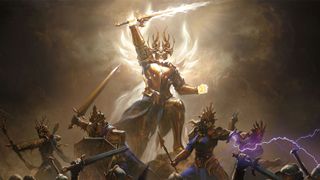
Sort of.
Diablo Immortal is perfectly enjoyable to progress through without spending a dime. When you finish up leveling your character, you'll find yourself starting to struggle to upgrade your gear and gems, and find rare Legendary equipment. It can be extremely frustrating to spend time running Elder Rifts – which are in essence, playable lootboxes – and not get higher end drops to help you upgrade your character.
Get daily insight, inspiration and deals in your inbox
Get the hottest deals available in your inbox plus news, reviews, opinion, analysis and more from the TechRadar team.
But if you don't mind the randomness and grind of sticking on the free track - there isn't anything gated behind real money throughout a story playthrough. You can stroll around Diablo Immortal and smash the minions of hell to your heart's content.
The smartest investment if you find you enjoy Diablo Immortal is simply to buy the basic battle pass to smooth out the rewards you receive, as it will give you some guaranteed Legendary gems and crests, among other useful things.
Diablo Immortal economy: What currencies are there?
Diablo Immortal is running with three different main currencies, each for a different purpose.
Gold
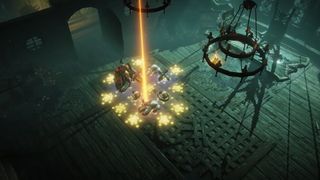
The staple of the Diablo series, gold is still what fills the wallets of every enterprising demon, undead, abomination, and minion of hell. Gold is the most common thing you'll find inside the Diablo Immortal economy, with common enemies littering the ground with piles of it from the very start of the game and quests rewarding it.
You can use gold for the following things:
- Buying items from NPC vendors.
- Upgrading your gear with NPCs.
- Creating a Clan for other players to join up to.
- Gambling for a shot at random gear (maybe better, maybe not).
Platinum
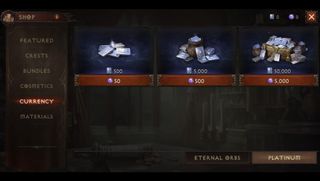
The shinier cousin of gold, platinum is also more difficult to earn. Enemies don't drop it, so you'll have to work harder to get it. Thankfully, the daily activity quests in Diablo Immortal reward you with some, and Diablo Immortal's player market operates entirely on platinum – so any choice gear you want to put up for sale can net you some. And the least attractive option is to spend money to get yourself platinum, since you can use Eternal Orbs (the real money currency) to buy platinum.
But more importantly, here's what you can do with platinum:
- Buy a Legendary crest from the NPC crest merchant (used to upgrade rewards in Elder Rifts)
- Purchase items for sale on the player item market.
- Spend it at the NPC jewelcrafter to craft Legendary gems.
- Swap them for Echo Crystals with the NPC crystal merchant to craft gems.
Eternal Orbs
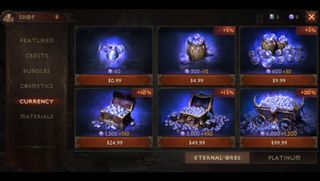
The final currency you'll find in Diablo Immortal is the Eternal Orb. You don't have to ponder these orbs too much, because Eternal Orbs are only available in the shop for real money. They don't come from anything else in Diablo Immortal, so anything they offer access to will be lifted straight out of your entirely mortal wallet.
Here's what Eternal Orbs can do:
- Purchase a variety of cosmetic skins.
- Purchase Reforge stones that are used for reforging items.
- Buy a Legendary crest (used to upgrade rewards in Elder Rifts).
- Increase the current tier of your Battle Pass, which unlocks specific rewards.
Diablo Immortal economy: How does the battle pass work?
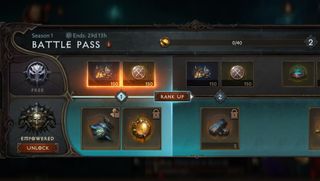
There is indeed a Diablo Immortal battle pass, like with most free-to-play games these days. You get access to the free version of the battle pass by playing, which will reward you with various things as you progress through its ranks. You don't unlock it until a bit into the story, however, so don't expect to see it until you enter Mad King's Breach.
There is also a paid version of the Diablo Immortal battle pass, called the 'Empowered Pass', which costs $4.99 for the upgrade. There's also an even-more-premium version which offers the same rewards, but automatically unlocks 14 ranks worth of the 'Empowered Pass' rewards for $14.99.
If you do purchase the paid battle pass, all of the paid rank rewards you've already passed by in the free version are also immediately unlocked.
You can expect the free battle pass to give you a variety of small benefits, upgrade items like enchanted dust, scrap materials, and crests. With the paid battle pass, you'll instead find gems, cosmetics, emotes, and other things. Most importantly, paying for the battle pass will get you Legendary crests and gems.

Phil is a Senior Writer of TechRadar Gaming (TRG). With three previous years of experience writing freelance for PC Gamer, he's covered every genre imaginable. For 15 years he's done technical writing and IT documentation, and more recently traditional gaming content. He has a passion for the appeal of diversity, and the way different genres can be sandboxes for creativity and emergent storytelling. With thousands of hours in League of Legends, Overwatch, Minecraft, and countless survival, strategy, and RPG entries, he still finds time for offline hobbies in tabletop RPGs, wargaming, miniatures painting, and hockey.
